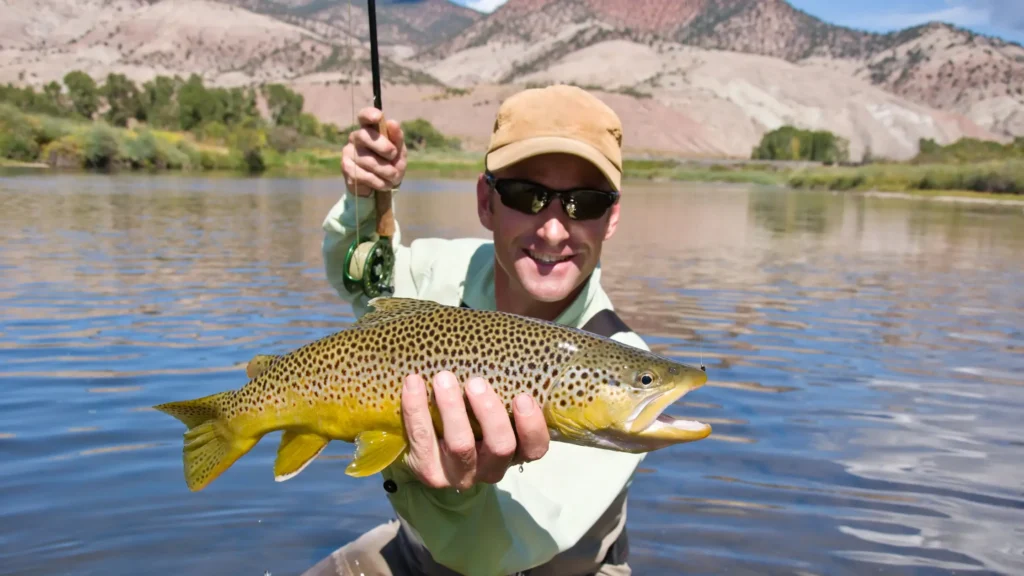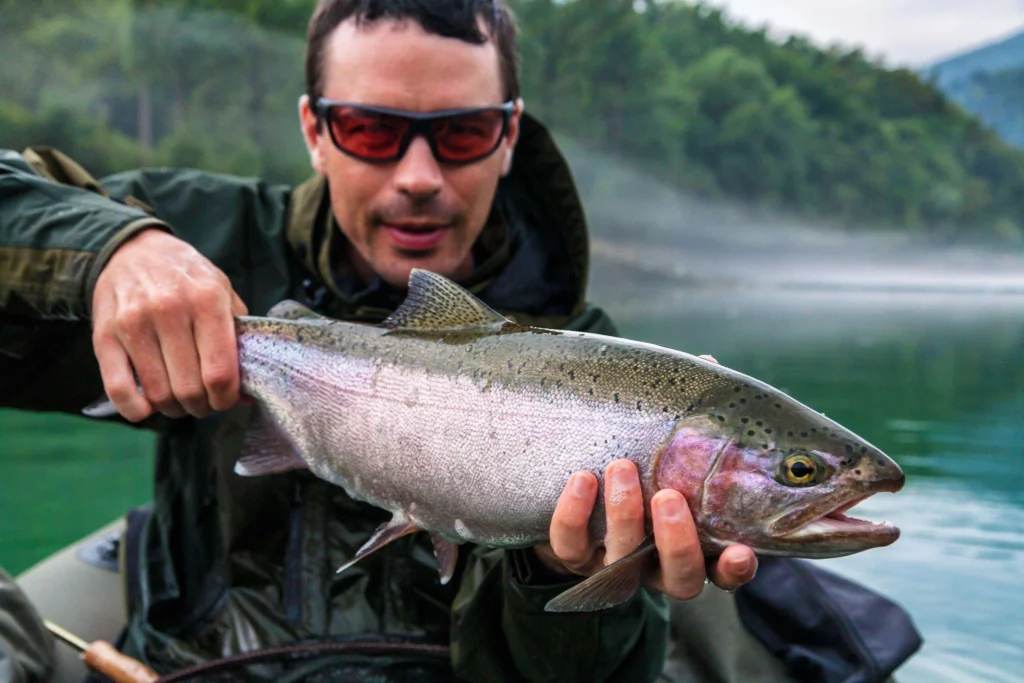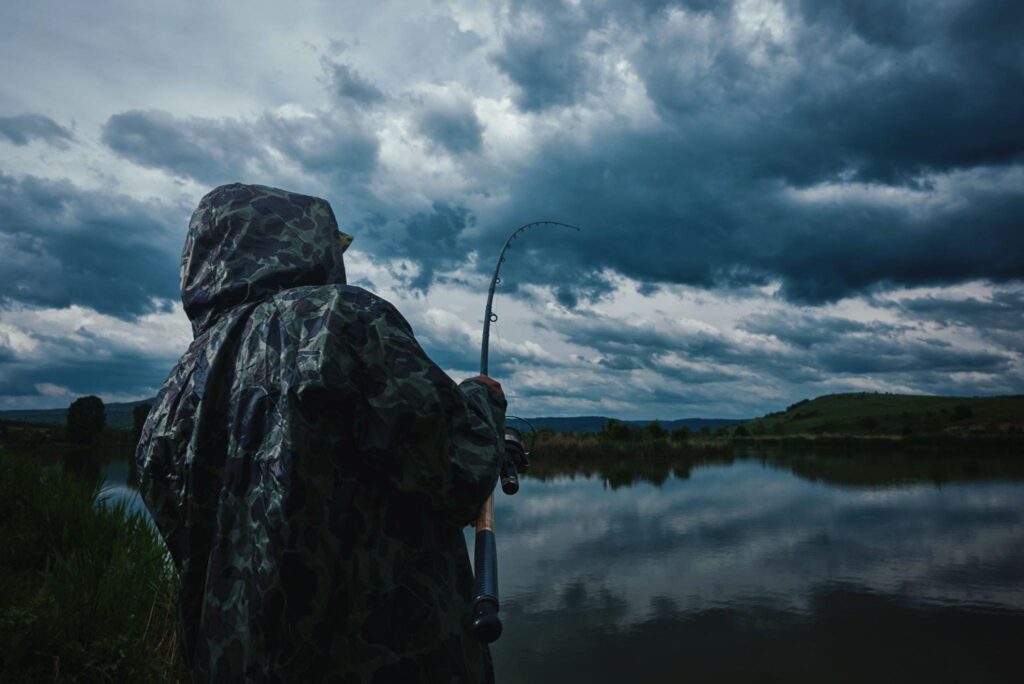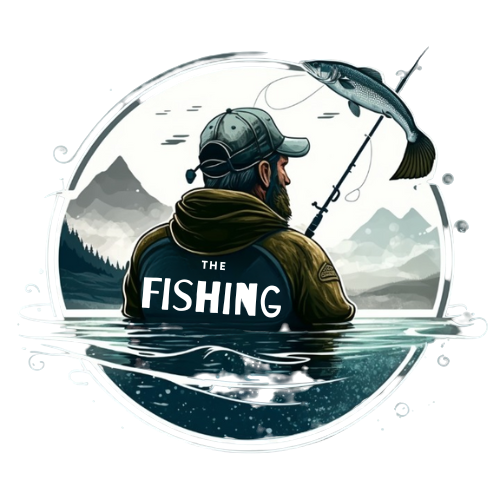Yes, you can catch trout in the rain. Rain can actually improve your chances of catching trout as it can wash insects into the water, which can attract hungry fish.

Trout fishing is a popular activity around the world, whether in rivers, lakes, or streams. It is a challenge for many anglers to catch trout, and sometimes factors like weather and environment can play a big role in the success of the catch.
One common question that comes up among trout fishers is, can you catch trout in the rain? While some may think that rain could ruin the fishing experience, the answer is quite the opposite. In this article, we will explore the benefits of fishing for trout in the rain and provide some tips to help you catch more fish when the weather turns wet.
Read more: Trout Fishing in the Rain: A Guide to Success
Table of Contents
How Does Rain Affect The Behavior Of Trout

Have you ever wondered if you can catch trout in the rain? If so, then this post is for you. Let’s have a closer look at how does rain affect the behavior of trout, and if it is possible to catch trout in the rain?
Trout behavior is significantly influenced by rain. The prime reasons behind this are:
- Changes in the water temperature
- Changes in the water level and clarity
- Changes in the food supply
When it comes to the rain’s ability to disrupt the natural food supply, it can lead to a lack of food, which may result in the fish being more likely to bite a baited hook.
Another reason why rain can be beneficial for catching trout is that rainwater can cause water turbulence. This disturbance moves the food source, making it easier for trout to locate and proactively hunt.
so, Can You Really Catch Trout In The Rain?
Yes, you can catch trout in the rain. In fact, it is an excellent opportunity for anglers to catch trout. Here are some tips to catch trout in the rain:
- Look for sheltered areas around bridges, overhanging trees, and rocks.
- Use live bait such as worms or maggots to motivate the trout to bite.
- Fish the current, the areas where different currents interact may be a good place to find fish.
- Use fishing lures that imitate prey that trout feed upon, such as small fry or insect larvae.
- Focus on areas of the stream where water flows into the main pool.
Although rain may seem like it will deter fish biting, it can, in fact, be the opposite for trout. Therefore, next time the rain forecast seems less than ideal, do not let it put you off fishing for trout. Head out, take these tips with you, and enjoy the experience of fishing for trout in the rain.
Read also: Is fly fishing only for trout?
How Does The Intensity Of Rain Affect Trout Behavior
Catching trout can be an exciting and rewarding experience for anglers, but the weather can play a significant role in their success. One factor to consider is the impact of rain on trout behavior. We will explore how the intensity of rain affects trout behavior, and whether or not you can catch trout in the rain.
Light Rain On Trout Behavior
Light rain can be beneficial for trout behavior because it can trigger insect hatches. The raindrops can cause vibrations that simulate the insect’s movement, making trout more likely to feed on the surface. Additionally, light rain can create a natural camouflage for anglers, masking their movements and allowing them to get closer to the fish without spooking them.
However, if the rain becomes too intense, it can have a negative effect on trout behavior. Heavy rain can cause a surge in water levels and currents, which makes it challenging for trout to hold their position in the stream.
This can result in them moving to deeper water or seeking shelter from the swift currents, making them less likely to feed.
Heavy Rain On Trout Behavior
Heavy rain can also impact the water clarity, making it difficult for trout to see and locate food. Silt and debris can be carried downstream during heavy rain, which can further impair visibility. During these conditions, trout are more likely to take shelter in deeper pools or under overhanging vegetation, making them harder to catch.
However, there are exceptions to this rule. After several days of heavy rain, the water levels may stabilize, and the clarity can improve as sediment and debris settle. This condition can stimulate trout activity as they search for food to replenish their depleted energy levels.
It is possible to catch trout in the rain. However, the intensity of the rain can significantly affect their behavior and feeding habits. Anglers should take into account the weather conditions and adjust their fishing tactics accordingly. By carefully choosing the right gear, location, and techniques, anglers can have a successful day on the water, rain or shine.
What Is The Best Bait For Trout In The Rain?
Trout fishing is a popular outdoor activity, but does rainy weather affect the ability to catch trout? Many anglers believe that fishing in the rain can be quite productive. However, to catch trout, it’s essential to use the right bait.
We’ll discuss the best bait for trout fishing in the rain in detail.
Why Is It Essential To Choose The Right Bait In The Rain?
In rainy weather, the water’s turbidity increases, making it challenging for the fish to see. As a result, selecting the right bait becomes critical.
Here are some reasons why it is essential to choose the right bait in the rain.
- Using the right bait can help the fish notice it in the murky water.
- The right bait can be attractive to the trout even as they struggle to feed in the rain.
- Bait with a strong scent can help the fish locate the bait more quickly.
What Are The Best Baits For Trout In The Rain?
Here are some of the best baits for trout fishing in the rain.
- Worms – trout love worms, and they work effectively in the rain, with the added benefit of the noise from the rain attracting fish to the surface.
- Powerbait – this bait has a strong scent and comes in various colors, which can be helpful in murky water. It’s also easy to use and can be molded into different shapes.
- Salmon eggs – trout love the taste of salmon eggs, and they can be an effective bait in the rain.
- Lures – lures mimicking small fish or insects can imitate the noise of insects landing on the water and attract trout in the rain.
- Corn – this bait is bright enough to be seen in murky water, and the sweet scent of corn can attract trout during rainy days.
Fishing for trout in the rain can be a successful endeavor. Selecting the right bait is essential for getting a good catch, and these baits mentioned above are some of the best choices you can make. By using the right bait, you can increase your chances of catching trout even in the rain.
What Is The Best Weather To Catch Trout In?

Trout fishing can be thrilling and rewarding. But weather conditions can directly impact the number of trout you can catch. Certain types of weather conditions can make it easier to catch trout, while others can make it more challenging. So, let’s dive into understanding the best weather for catching trout:
Overcast Days
On overcast days, the clouds block out the sun, resulting in cooler water temperatures; this makes it easier to catch trout as they tend to swim closer to the surface in search of food. Cloud cover also provides good protection for trout from predators, making them more comfortable wandering out in search of food.
- Overcast days can also provide ideal conditions for fly-fishing enthusiasts, especially in streams, as fly hatches tend to happen during low light conditions, such as overcast days.
Rainy Days
Rainy days can be a double-edged sword when it comes to trout fishing. However, if you are willing to bear the weather, a rainy day can be a productive day for catching trout.
- When it rains, the water levels in streams and rivers rise up, increasing the current, and providing nourishment to the water body. As a result, trout become more active and tend to feed more.
- A steady rainfall can lead to a consistent supply of insects and other bugs in the water. With this increase in natural food supply, fish become less picky and more aggressive, making them easier to catch.
- However, heavy rain can lead to murky river water, which can make it difficult for fish to see lures or baits.
Sunny Days
Sunny days may not seem like the best weather for fishing, but they can be productive if you know what to look for.
- When the water is clear, and the sun is shining, trout can be seen swimming in deeper water. This makes it easier to spot and target them. You can cast bait or lures in the deeper water and retrieve them slowly to attract the fish.
- Sunny days can also be productive for fishing in lakes and ponds. Trout tend to feed on smaller prey such as midges, leeches or insects. These insects rise to the surface to soak in the sun’s warmth, which attracts fish to the surface.
The best weather to catch trout depends on the location, time of the year, and the type of trout you are targeting. Keep experimenting with different weather conditions and techniques to increase your chances of landing a catch. Remember to follow local regulations and practice safe and ethical fishing practices.
What Time Are Trout Most Active?

Rainy weather is often not the most appealing time to go fishing. But for trout anglers, the rain can actually bring some exciting fishing opportunities. And one of the questions often asked is, “can you catch trout in the rain?
” the answer is yes!
Trout, like many other fish, tend to be more active during specific times of the day, and this can change depending on the weather or the season. Here are some key points on when trout are most active:
- Early morning: The early morning can be an excellent time to fish for trout as they tend to feed actively during this time. It’s also a great time to enjoy the peace and quiet of nature.
- Late afternoon: Similar to the early morning, late afternoon can be a productive time for trout fishing. As the sun begins to set, the water temperatures may start to cool down, signaling feeding time for the trout.
- Overcast days: Trout tend to be more active on overcast days as the clouds provide cover and a cooler water temperature. The low light levels may also make it easier for them to spot prey.
- Wet weather: While not the most comfortable conditions for us humans, rainy weather can be great for trout fishing. As the rain hits the surface of the water, it creates ripples and makes it harder for the fish to see. These conditions may make it easier to catch a trout.
Tips For Trout Fishing In The Rain
If you’re brave enough to venture out on a rainy day, here are some tips to help you make the most of your fishing trip:
- Dress appropriately and stay dry: A waterproof jacket, pants, and boots will keep you dry and comfortable.
- Use darker-colored lures and flies: As the water becomes more turbid from the rain, using darker-colored lures or flies may help the trout see them better.
- Fish near structures and cover: Trout may seek shelter near structures and cover in rainy weather, so it’s a good idea to focus on those areas.
- Slow down your retrieve: Trout may not be as active in the rain, so slowing down your retrieve may entice them to bite.
- Be patient: Fishing in the rain requires patience. Don’t get discouraged if the fish aren’t biting right away. Keep trying different techniques and areas until you find what works.
The Bottom Line
Rainy weather can bring about some of the best trout fishing conditions. Trout may be more active during specific times of the day and in certain weather conditions.
After examining the question of whether you can catch trout in the rain, there is no doubt that we can confidently say the answer is yes. Not only is it possible, but it can even be beneficial. The rain can cause an increased flow of water, which can make trout more active and easier to catch.
